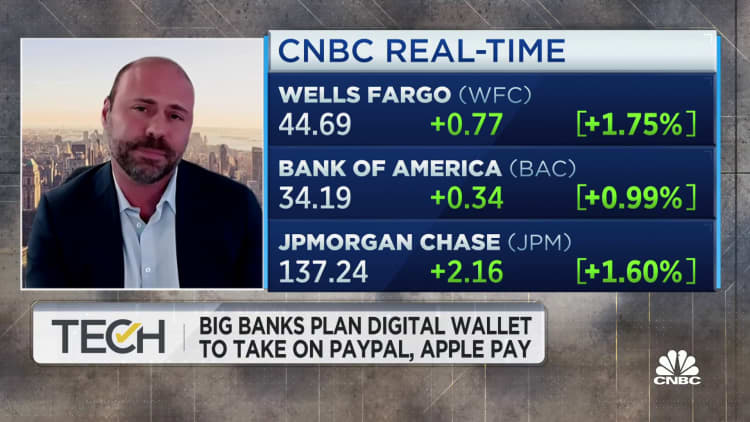The battle for your digital wallet is on

What the war on the wallet means to you
“The pitch for consumers is a simpler online payment experience,” Rossman said. “You don’t need to enter all your card information because it is already stored in the system.
“And it will be managed by the banks, who in theory will have better fraud protection than retailers.”
The good news is “they’re already a regulated sector,” added Pam Dixon, executive director of the World Privacy Forum, a nonprofit research group, unlike the equally popular buy-now, pay-later programs.
But “consumers still need to be very careful,” Dixon warned. “This is your financial information.”
Digital payments are growing in popularity, but are they safe?
During the pandemic, shoppers showed a growing preference for cashless transactions and continue to do so: Peer-to-peer payment apps – known as P2P – such as Zelle and Paypal’s Venmo, which allow users to store their banking information on their smartphones, have exploded in popularity.
Now, 64% of Americans use peer-to-peer payment apps, but for young adults, that jumps to 81%, according to a March 2022 survey by Consumer Reports.
About 40% of the more than 2,000 respondents said they use payment apps at least once a month, while 18% use them at least once a week.
Digital payments are generally more secure than credit card transactions because there is a biometric component, Rossman said — “this online solution will likely have some kind of two-factor authentication, like a code sent via text message.”

But it is not without risk. Users are vulnerable to fraud or scams or could lose money if they accidentally send a payment to the wrong person, a Consumer Reports analysis found.
And peer-to-peer payments still have varying degrees of consumer protection, which can cause a problem when it comes to getting a refund.
Trying to get money back into your personal account after it’s transferred to someone else can take more work compared to requesting a refund from a credit card company, which often reverses charges almost immediately and fights on your behalf.
“It’s kind of like putting the toothpaste back in the tube,” Rossman said.
‘Let the buyer beware’
Zelle in particular has been the subject of recent criticism. A US Senate report last fall stated that “Zelle is rife with fraud and theft, and few customers are getting refunds — potentially in violation of federal laws and consumer regulations.”
The Consumer Reports analysis included a call to policymakers to strengthen consumer protections. “There is a lag between the protections available to consumers and the latest technologies for payments,” said Delicia Hand, director of financial justice for Consumer Reports.
Meanwhile, “payment providers can raise the bar for consumer protection by taking more aggressive steps to minimize user risk,” Hand added.
If you’ve never used a digital wallet before, make sure you do a few test runs and don’t send large amounts.
Pam Dixon
executive director of the World Privacy Forum
In contrast to these findings, “99.9% of the 5 billion transactions processed on the Zelle network over the past five years were sent without any report of fraud or fraud,” the American Bankers Association, Bank Policy Institute, Consumer Bankers Association and The Clearing House said in a joint statement.
And in any case where a customer disputes a transaction made through Zelle, banks are required by federal law to investigate and issue a refund if the transaction was unauthorized, the statement said.
For now, Dixon offers this advice to consumers: “Let the buyer beware.”
“If you’ve never used a digital wallet before, make sure you do a couple of test runs and don’t send large amounts.”
Also, adjust your privacy settings to minimize the amount of information companies collect, Hand advised.
Subscribe to CNBC on YouTube.


